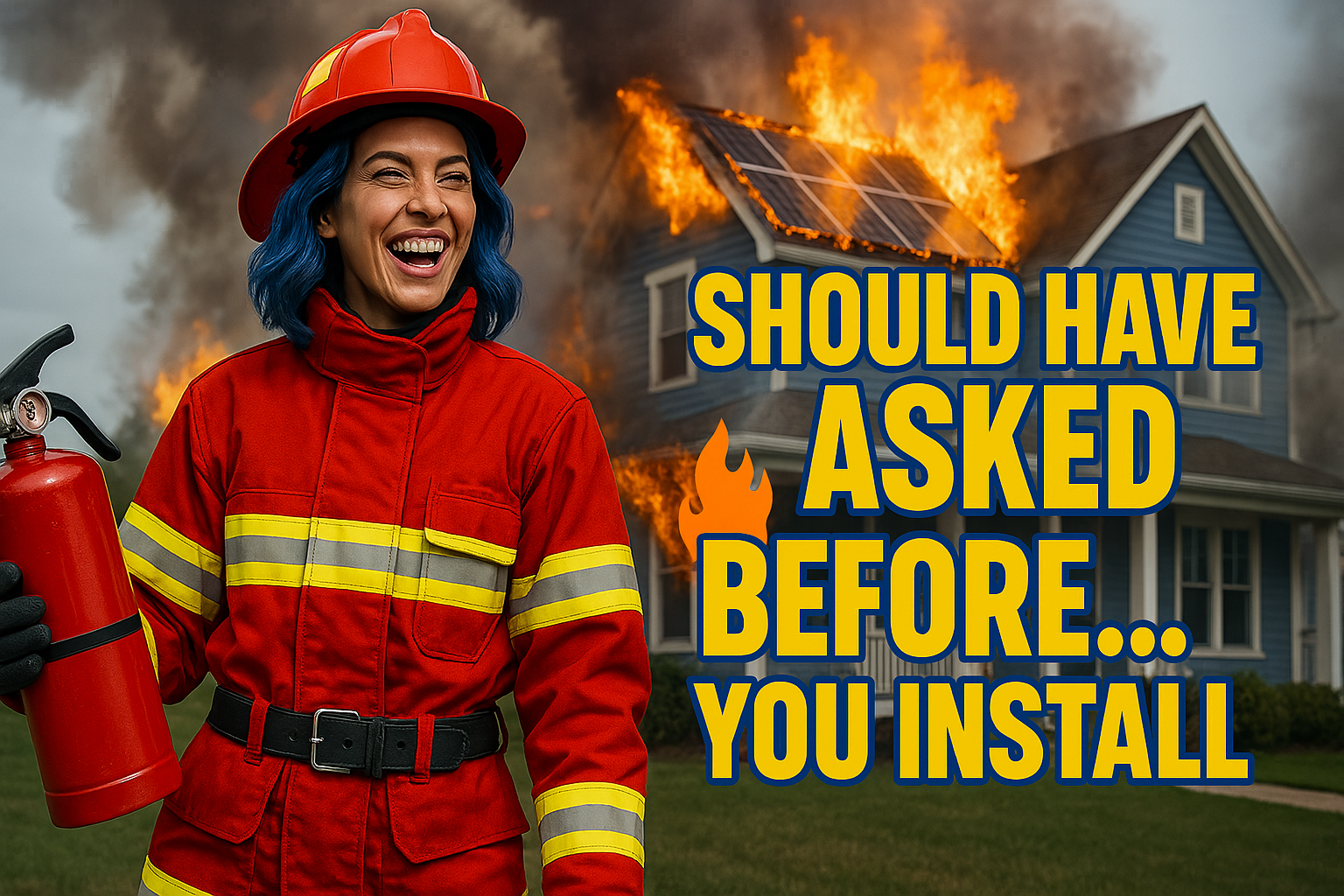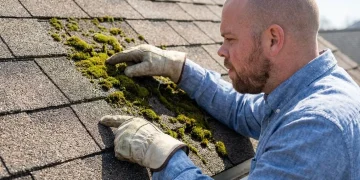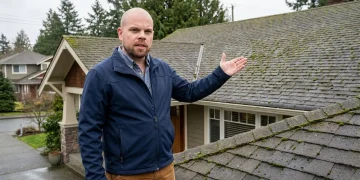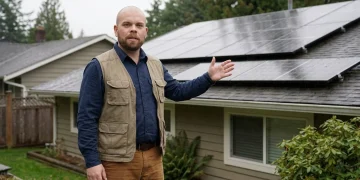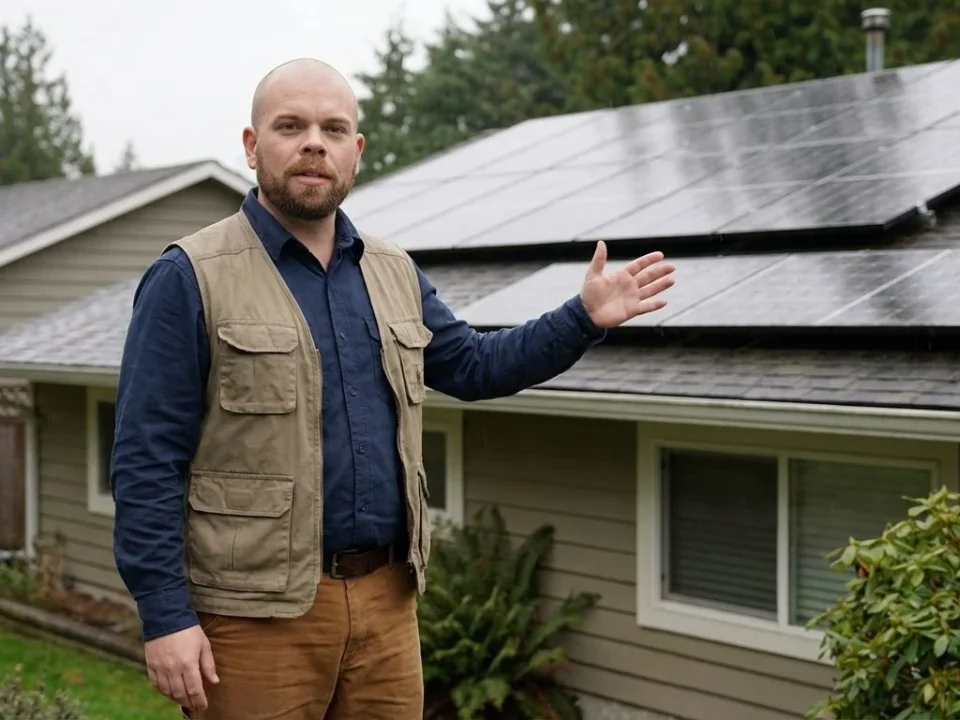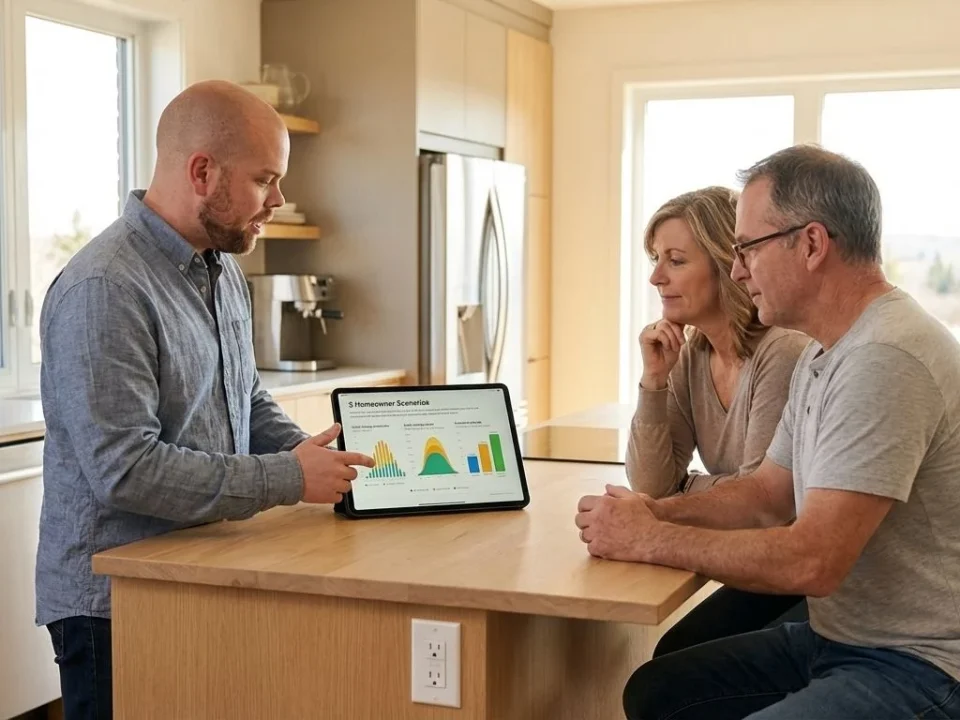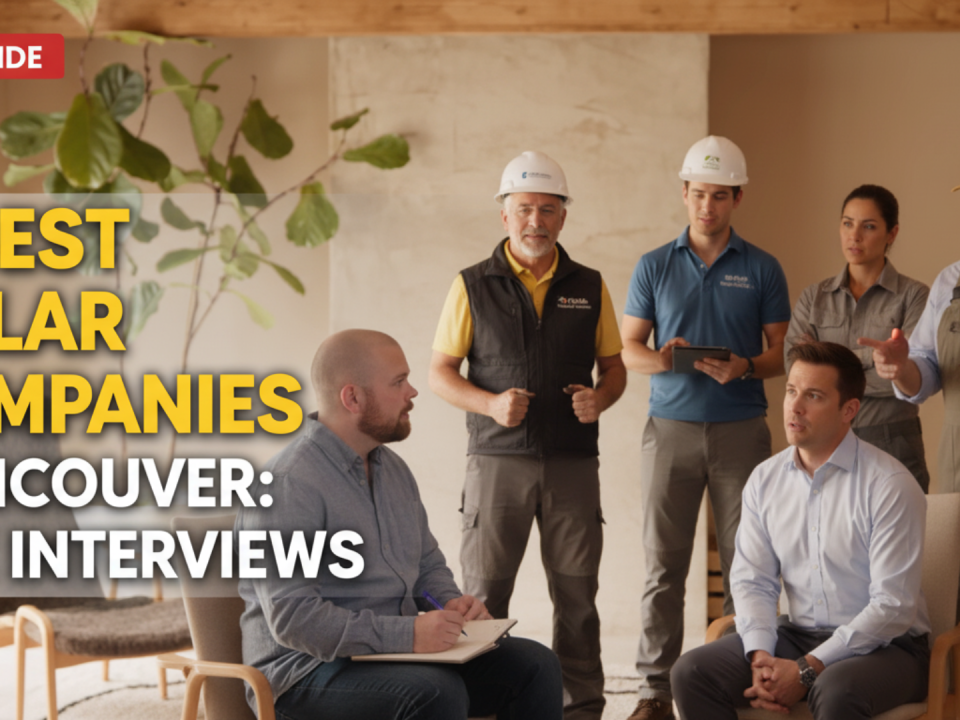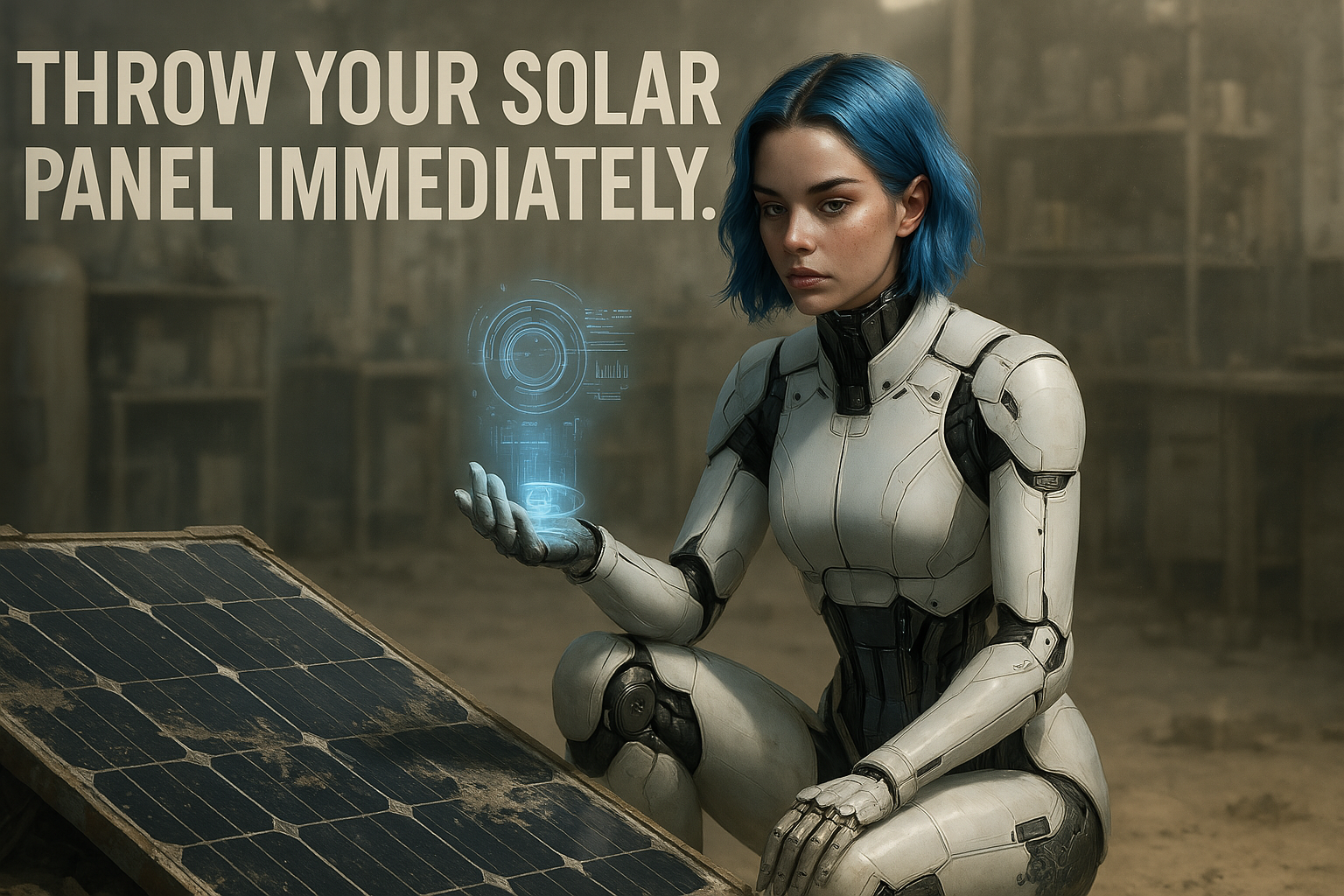
New Solar Panels Study from Fraunhofer Institute: Should We Be Worried?
April 3, 2025
How Solar Farms and Farmland Can Coexist With Real Examples
April 5, 2025Going solar is exciting! It’s a smart investment in solar energy for your home and the planet. But let’s be real, choosing the right solar installer from the many solar companies out there can feel like a lot. The Canadian solar market is growing fast, which is great, but it also means the experience level of installation companies can vary quite a bit. You need a partner you can trust. Asking the right questions helps you vet potential solar installation companies and find a good solar installer who fits your needs.
Think of it like this: you wouldn’t hire a contractor for a major kitchen reno without checking them out thoroughly, right? Same goes for putting solar panels on your home. Let’s break down the key questions to ask solar companies.
Understanding the Basics of Solar Installation
First things first, you need to get a handle on the hardware and how it fits your specific situation. Don’t just nod along; ask pointed questions about the solar equipment proposed.
What types of solar panels do you recommend for my property?
Not all solar panels are created equal. The main types you’ll hear about are monocrystalline, polycrystalline, and sometimes thin-film.
- Monocrystalline solar panels are known for their efficiency in renewable energy production. These are usually black, highly efficient (often 20-25%), and perform better in low-light conditions – a big plus during Canadian winters. They often cost a bit more upfront.
- Polycrystalline: Typically blue, these are made from multiple silicon fragments. Their efficiency is slightly lower (maybe 18-21%), but they’re generally less expensive.
- Thin-Film: Less common for residential solar, these are lightweight and flexible but have the lowest efficiency (17-19%) and shorter lifespans.
Ask your solar installer: “Why are you recommending this specific type of panel for my home? What’s its efficiency rating, power output, and temperature coefficient?”. The temperature coefficient tells you how much efficiency drops as the panel heats up – a lower number is better, though cold Canadian weather can actually boost panel efficiency.
- Tip for Canadians: Monocrystalline panels are often a good bet here because they handle lower light well. But your installer should justify their specific recommendation based on your roof, budget, and location.
How do you determine the right system size for my energy needs?
A solar energy system needs to be sized correctly. Too small, and you won’t save much on your energy bills. Too big, and you’ve overpaid. The installer should analyze your past electricity bills (usually 12 months’ worth) to understand your annual energy use.
Ask the company: “How did you calculate the proposed system size? “What percentage of my current electricity usage is it expected to offset, according to the questions you should ask during consultations?” They should factor in your home’s specifics: roof size, angle, orientation, and any shading from trees or buildings.
What are the key components of a solar energy system?
Besides the solar panels themselves, what else is involved? You should know the main parts:
- Solar Panels: Capture sunlight.
- Inverter(s): Converts the DC electricity from panels to AC electricity your home uses. This is a critical piece of solar equipment. Ask about the brand (like Fronius or Canadian Solar) and model. Are they using a single string inverter, microinverters (one per panel, good for shade ), or a hybrid inverter (for solar batteries )? What’s the inverter warranty? (Often 10 years for string, up to 25 for microinverters ). Fronius Canada offers 10+2 years on theirs, which is an important question to ask any solar panel installer..
- Mounting/Racking: Secures panels to your roof or the ground.
- A Monitoring System is crucial for tracking the performance of your renewable energy setup. Lets you track your solar power production online or via an app.
Ask a solar installer: “Can you list all the major components included in the quote, including brand names and model numbers?”.
Company Credentials and Experience
Okay, you understand the tech better. Now, who exactly are you dealing with? You need a reputable solar installer.
How long have you been in the solar installation business?
Experience matters, especially in a market with specific regional quirks like Canada’s. A company with a longer track record is often more stable and has likely worked through various installation challenges.
Ask solar companies: “How many years have you been installing solar panels, specifically in my province/region? “How many home solar systems have you installed locally, and what important questions should I consider?”. A company familiar with local rules, weather (like heavy snow ), and utility interconnection processes is invaluable. I remember helping a neighbour navigate a tricky permit issue a few years back; their installer was new to the area and missed a crucial local bylaw – easily avoided with local experience.
Are you licensed and insured for solar installations?
This is non-negotiable. Your solar installer must be properly licensed to operate, bonded (which protects you if they don’t finish the job ), and carry comprehensive insurance.
Ask before installing solar panels: “Can you provide proof of your business license, bonding, and insurance (General Liability and WCB)?”. You need to see the documents.
Can you provide references from previous clients?
Don’t just take their word for it. Talk to people who’ve actually used their services.
Ask a solar company: “Could I have a list of references, ideally from customers near me whose systems were installed a few years ago?”. Ask these references about their experience: communication, timeliness, installation quality, and any issues they faced. Also, check online reviews (like Google or BBB), but take them with a grain of salt.
What certifications do your technicians hold?
While not always mandatory in Canada, certifications show a commitment to quality and ongoing training.
Ask your solar installer: “Are your installers certified? Do they hold NABCEP (North American Board of Certified Energy Practitioners) certification? Is the electrical work done by licensed electricians?”. CSA (Canadian Standards Association) certification for renewable energy systems is essential. equipment is also important, ensuring it meets Canadian safety standards. Using qualified pros ensures safety and code compliance.
- Tip for verification: Don’t just ask; request to see copies of licenses and certifications. Reputable solar companies will provide these readily.
Installation Process and Timeline
Alright, you’ve vetted the company and the gear. What actually happens during the solar panel installation?
What does your installation process look like?
Get a clear picture of the steps involved, from start to finish. Typically, it goes something like this:
- Site Assessment: They visit your home to check the roof, take measurements, and assess shading.
- System Design: They design the optimal layout for the solar panels.
- Permitting: They (should) handle getting building and electrical permits, plus utility approval.
- Installation Day(s): The crew arrives, installs racking, mounts panels, connects wiring, and installs the inverter. This usually takes 1-3 days for a residential solar project.
- Inspection: Local authorities inspect the work.
- Commissioning/Activation: The system is turned on and connected to the grid.
How long will the installation take from start to finish?
While the physical work is quick, the whole process takes longer, especially when considering the federal solar tax credit..
Ask the company: “What’s the total estimated timeline, from signing the contract to the system being operational?”. Be prepared for it to take 2-6 months, largely due to paperwork – permits and utility interconnection agreements often take the most time.
Will there be any disruptions to my daily routine during installation?
Usually, disruptions are minimal. The crew works outside mostly. There might be some noise, and your power may need to be shut off briefly for the final electrical hookup.
Ask your installer: “What disruptions should I expect? Will I need to be home?”
What permits are required, and will you handle them?
Permitting is crucial and can be complex, varying by location. You’ll likely need building and electrical permits.
Key question to ask solar companies: “Will you manage all necessary permits and approvals, including the utility interconnection agreement?”. A good solar installer handles this headache for you. They should be familiar with local requirements, whether in Toronto, Surrey, Ottawa, or elsewhere.
Warranty and Maintenance Services
A solar system is a long-term investment (think 25+ years ). What happens after installation?
What kind of warranty do you offer on the solar panels and installation?
You need to understand the different warranties:
- Product/Equipment Warranty: Covers defects in the panels, inverter, and racking. Panel warranties are often 10-25 years; inverter warranties vary (10-25 years).
- Performance Warranty (Panels): Guarantees panels will produce a certain percentage of their rated power over time, usually 25 years (e.g., 80-87% output after 25-30 years). Ask for specifics on the degradation rate. Canadian Solar, for instance, has specific warranties depending on the panel type.
- Workmanship Warranty (Installation): Covers errors made during the installation itself, like roof leaks or wiring issues. This typically comes from the solar installation company and might range from 1-10 years, though some offer longer (e.g., 25 years). Open Waters Solar offers 5 years, while CertainTeed offers up to 25 years through certified installers.
Ask these questions: “Can you provide documentation for all warranties? What’s covered under the workmanship warranty, and for how long?”. Also ask, “What’s the process for making a warranty claim? “Who is my primary contact for questions you need to ask regarding the installation?”.
- Tip for homeowners: Consider asking the important questions before choosing a solar panel installer. Keep copies of all contracts and warranty documents safely stored. Ask if warranties are transferable if you sell your home.
What maintenance is required?
Good news: solar panels generally require very little maintenance. Rain usually keeps them clean enough. In Canada, snow is the main consideration.
Ask about solar panels: “What maintenance do you recommend, especially considering snow? Do I need to clear snow off the panels?”. Often, snow slides off on its own once the sun hits the panels. Heavy buildup might slightly reduce production temporarily. Some people use a soft snow rake, but often it’s not necessary. The installer should advise based on your local climate and panel tilt.
How will you protect the system from animals and ensure roof integrity?
Critters like squirrels nesting under panels can damage wiring. And roof penetrations are necessary but must be sealed properly.
Ask your solar company: “Do you install ‘critter guards’ (mesh barriers)? What specific methods and materials (like flashing, not just caulk) do you use to prevent roof leaks around the mounts?”. A reputable installer prioritizes protecting your roof. I once had a client whose previous (different company) install resulted in a leak because the installer cut corners on flashing – it’s a detail that really matters!
Costs, Savings, and Incentives
Let’s talk money. Switching to solar involves costs, but also savings and potential incentives.
Can you provide a detailed breakdown of all costs?
Transparency is vital. Get everything in writing.
Ask for a detailed breakdown: “Please provide an itemized quote showing costs for solar equipment (panels, inverter, racking), installation labor, permits, and any other fees. Are there potential hidden costs like electrical panel upgrades?”. Comparing quotes based on cost per watt ($/W) can be helpful when evaluating solar panels cost..
What Canadian solar incentives and rebates are available?
This is key to making solar affordable. Programs exist at federal and provincial levels.
Ask about solar incentives: “What federal programs (like the Canada Greener Homes Grant/Loan ) and provincial rebates (e.g., BC Hydro, Efficiency Manitoba, SolarHomes Nova Scotia, Ontario’s HRSP, NB Power’s program, etc.) apply to me? Will you help with the applications?”. A good company stays current on these and guides you. Remember, programs change – PEI’s rebate was recently paused, for example.
Do you offer financing options?
Many solar companies offer ways to finance your solar energy system.
Ask about financing: “What financing options (solar loans, leases, PPAs) do you offer? What are the interest rates, terms, and fees?”. Owning (cash or loan) usually provides the best long-term value compared to leases or Power Purchase Agreements (PPAs). The Canada Greener Homes Loan is an interest-free option to explore.
What is the estimated payback period and ROI?
Understand the long-term financial picture.
Ask your solar provider: “What’s the projected payback period for this system? What’s the estimated return on investment (ROI) over its lifespan (e.g., 25 years)?”. These estimates depend on your location’s sun, electricity rates, system cost (after incentives), and energy production. Get realistic projections.
Final Thoughts: Making an Empowered Choice
Choosing to go solar is a fantastic step towards energy independence and sustainability. But the success of your investment heavily relies on choosing the right solar installation company. Don’t rush the process. Get multiple quotes. Ask tough questions – the 10 questions to ask a solar installer we’ve covered here are a great start. Know what questions to ask, listen carefully to the answers, check references, and verify credentials.
By doing your homework and asking the right questions, you can confidently select a reputable solar installer and ensure your journey to harnessing solar power is smooth and rewarding for years to come. That’s the kind of straightforward, no-fluff guidance we aim for at SolarEnergies.ca – helping Canada go solar, one informed homeowner at a time. Furthermore, being well-informed also involves understanding solar panel scams, which can prey on unsuspecting consumers. Educating yourself about common deceptive practices will empower you to make safer decisions and protect your investment. With the right knowledge, you can fully enjoy the benefits of solar energy without falling victim to fraudulent schemes.

